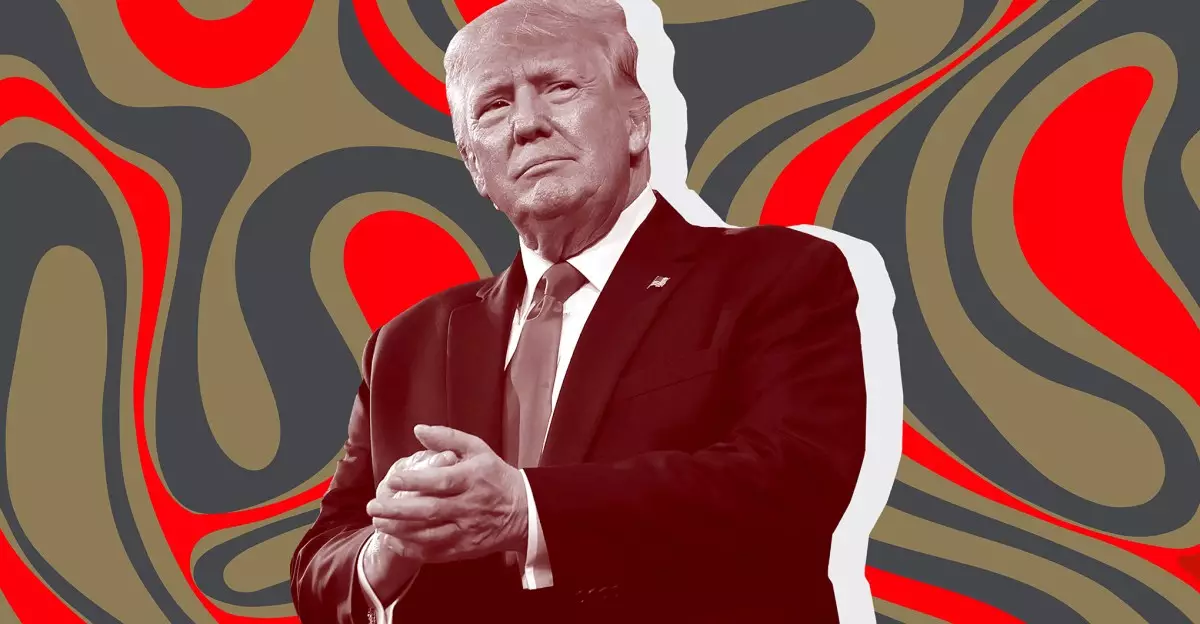The recent surge of interest in $TRUMP coin, a digital currency linked to former President Donald Trump, certainly captures attention in both the crypto space and the political realm. After the announcement of a private dinner for the top holders of this cryptocurrency, its market capitalization skyrocketed by an astonishing $100 million. Such a dramatic demand shift raises eyebrows, not only because of the financial implications but also due to ethical questions surrounding the motivations behind facilitating such a contest. This intersection of finance and politics deserves a closer examination amid the hue and cry of potential moral violations.
The Mechanics Behind the Contest
At the core of the contest lies a two-prong approach incentivizing both investment and loyalty—two components that typically drive speculative markets. The contest, aimed at the highest 220 holders of the $TRUMP coin, offers an enticing opportunity for fans of the former President to enjoy exclusive access and experiences. The top 25 holders gain entry to a private reception with Trump and a personal tour of the White House. The mechanics—the more tokens one holds and the longer they stay in possession of them—create a gaming-style environment that leverages loyalty, mirroring traditional loyalty rewards plans but on an outrageous scale.
This format appeals not only to the most committed supporters of Trump but against the backdrop of a fluctuating and often volatile cryptocurrency market. It’s nostalgia mixed with modern-day digital innovation, effectively creating an arena where financial gain and emotional attachment coalesce. It complicates the cryptocurrency narrative, turning a mere investment into an emblem of political allegiance, with an overt and bordering scandal of marrying governmental access to financial backing.
The Ethical Quagmire
The ethics surrounding Trump’s actions in this scenario operate on an arguably treacherous tightrope. Prominent Democratic Senators have raised alarms, characterizing the incident as a brazen potential for “pay to play” corruption, and it’s tough to overlook the blatant connections they suggest between wealth accumulation and political access. Their requests for a federal investigation highlight the suspicion that the former President may be profiting off what many believe should be non-partisan governance.
Critics like Senator Chris Murphy have not been shy in their disapproval. Expressing that this moment could represent “the most brazenly corrupt thing a President has ever done,” such allegations certainly add weight to the overall critique of Trump’s open intertwining of personal financial interests with his role in the government. The timing of his maneuver—while holding a powerful position—creates an air of impropriety that citizens should be wary about as it could mean eroding trust in public service institutions.
Political Dynamics and Implications
One must reflect on the implications of this venture within the current political landscape. The control Republicans have over Congress creates a climate where there may be little incentive for serious inquiries into Trump’s conduct, further complicating the integrity of those governing decisions made in an increasingly digital age. Trump’s long-term courtship of the crypto community reflects an alignment between emerging technologies and the political strategies meant to promote them—hinting at a future where access to influential leaders will increasingly be dictated by financial leverage.
Trump’s decision to appoint a “crypto czar” shows an intentional effort to intertwine the two worlds, which some may view as a progressive move towards modern governance, while others see it as a familiar pathway to corruption. The political ramifications appear dire: with crypto companies throwing millions at campaign efforts, the landscape looks like a commercialized political playground where transparency might be less of a priority than a lucrative digital economy.
The Future of Crypto and Governance
As we navigate through these tumultuous waters, it becomes fundamental to ponder the future ramifications that cryptocurrency and political relationships may generate. Without stringent regulations to curb such ethically ambiguous practices, the potential for exploitation appears vast. The blending of political influence and financial investment may pave the way for an era where financial empowerment is the new ticket to power—a concept not rooted in democratic ideals.
In an age where the lines between currency, loyalty, and governance blur, the importance of preserving ethical standards has never been more critical. The fate of $TRUMP coin and its influential connections to political processes will surely inspire debates and implications that could extend far beyond the realm of cryptocurrency. The stakes of economic and political involvement are high, and they may redefine our understanding of both democracy and digital currencies.


Leave a Reply